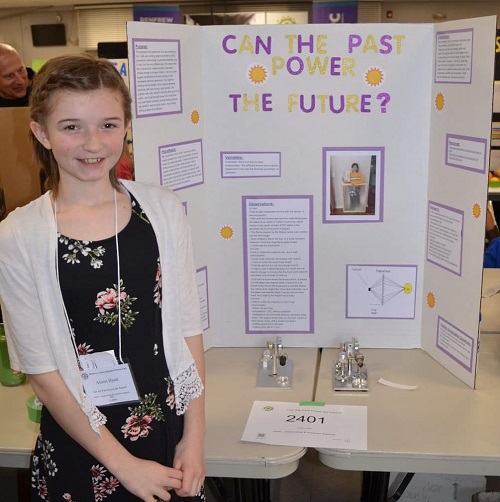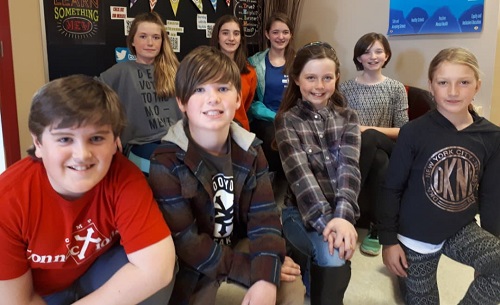by CONNIE TABBERT
Editor
WHITEWATER REGION (Cobden) — A Grade 7 student at Cobden District Public School will be competing at the Canada Wide Science Fair in Fredericton, New Brunswick next month.
Ali Hyatt’s project Can the Past Power the Future? was the top project selected in the Junior Division. Her sister Sam, in Grade 8, was second.
“Both projects were excellent and the judges had a difficult time deciding on a winner,” said teacher Lorraine Hamilton.
Ali also won the Excellence in Nuclear Research while Sam won the Ontario Power Generation Award.
There are four students from the Renfrew County District School Board who will be attending the fair in Fredericton next month, Mrs. Hamilton said.
In deciding on her project, Ali said the biggest problem we are facing today is climate change and one of the biggest contributors to climate change is greenhouse gases, which are non-renewable electricity generation, coal, fossil fuels, etc.



There are already several ways of generating electricity that’s eco-friendly that doesn’t produce greenhouse gases like solar, wind and hydro, she said
The purpose of Ali’s project was to focus on solar.
There are two issues with solar, she said. The first is solar panels take up a lot of space and secondly, use up a lot of resources. She noted in making solar panels, a lot of mining items are required.
“I wanted to find a way that still produces electricity with using solar energy that didn’t take up as much space and use as many resources,” Ali explained.
She did research and found Stirling engines.
“A Stirling engine is a heat-powered engine that was originally invented in 1816,” Ali said, adding, “It was used to power cars…and sometimes used to generate electricity using an alcohol lantern to heat up the engine.”
The problem with generating electricity using an alcohol engine is that coal is being burned, which creates greenhouse gases, which are very harmful to the environment, she said.
“I wanted to find a way to power the engine without it being harmful to the environment,” and she did.
She found Fresnel, which was originally used in lighthouses and is a solar concentrator. Explaining, Ali said, “The sun’s energy goes to the ridges on the Fresnel and the ridges bend and refract the light to one specific point which is called a focal point. With all that concentrated sun energy, it heats up a lot. So, I figured that heat would be enough to power a Stirling engine.”
In deciding what science project she wanted to work on, Ali said she wanted to do something with climate change because it’s a big problem.
What is climate change?
“We’re doing a lot of stuff that affects the environment, so like generating electricity or driving cars, all the emissions that come off of them are stuck in the atmosphere and when sun energy enters the atmosphere it can’t escape because all the greenhouse gases are blocking it, which warms the earth; and the problem with climate change is that it’s very harmful to the environment because it’s killing off species because of how it affects their environment.”
Climate change is a real thing, Ali said. She believes some people refuse to believe there isn’t global warming, or climate change, because of the record-breaking cold temperatures. However, the cold temperatures are happening because the sun’s energy is heating the earth in the Arctic where the cold air is. There is a field keeping the cold in the Arctic, however, the sun’s energy is getting trapped due to the greenhouse gases, which is causing the field around the Arctic to melt, she explained.
Ali is “excited and nervous” about competing at the national science fair.
“At the Canada wide science fair there are a lot more projects, more people and it’s the best projects in all of Canada, so it’s going to be very difficult,” she said.
She also must write a five-page type-written report on her project as well as an autobiography.
Ali will be travelling with Aidan Leach from the Renfrew County Science Fair Committee and the other three students.
Her father Murray, who has created the interest in science because of his work at CNL in Chalk River, will also be attending the Fair, but not until near the end, she said.
This was Ali’s third time competing at the regional science fair, which was April 6 in Petawawa. When she was in Grade 5 she entered the Grade 6 division and won her division, however, it was only Grades 7 and 8 students who went to the national fair.
In her second year, which was again in Grade 6, Ali won her division again, along with the OPG award.
Ali wishes more students would participate in the science fair.
“There’s not a lot of projects and I feel science is very important in our every day-to-day life,” she said. “We need to find a way to get kids interested in science.”
She noted there is a lot of friendly rivalry between herself and sister Sam, and admitted, “I honestly think her project was better than mine. Her project was … doing the math side of a wind-powered car and the only reason why mine was chosen, is the judges didn’t think hers would work.
“The idea behind hers was better than the idea behind mine.”
Mrs. Hamilton wasn’t surprised to hear Ali say her sister should have been chosen.
“Sam and Ali are sisters and the two of them were in the engineering division,” she said. “The co-ordinator said the judges had a really hard time picking first or second.
“They are just such nice girls, they would always want the other one to win,” Mrs. Hamilton said, adding, “They are smart, good students, just nice kids. They are dream students to have in your classroom.”
Mrs. Hamilton has been teaching for 31 years and has always believed students should enter science fairs. When she came to Cobden District Public School a few years ago, there was no science fair entries, so she encouraged the students to participate in the fair. When she taught science, it was part of the curriculum to make a science project.
The regional science fair used to be held at The Place in Pembroke, eventually going to smaller venues, ending up in Petawawa.
A couple of years ago, she noted there were only about 12 projects at the fair.
This year, because the science fair committee is becoming more active, instead of four schools participating, there were 13 schools, she said.
Mrs. Hamilton noted any student can enter a science or technology project to the regional science fair. With the introduction of STEM (Science, Technology, Engineering, Math) into the curriculum, there is more interest in science projects again.
While she’s not teaching science this year, she still encouraged the students at CDPS to participate, and this year, 11 students entered projects.
In Grades 5 and 6, Dallas Byce and Winston Burgess won second place in the health sciences with Danica Smith placing third. Abby Elliott received honourable mention in the physical science division. Autumn Bakhuyzen also had her project in this division. In Grades 7 and 8, Mya Letourneau and Madi Oliver received honourable mention in health sciences with Scotia Davidson and Bianca Ferguson getting one of the Judge’s Choice Awards.







![Kenopic/Smith Auction [Paid Ad]](https://whitewaternews.ca/wp-content/uploads/2018/10/advertising-100x75.jpeg)

